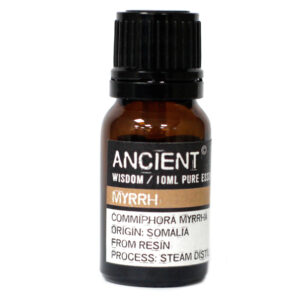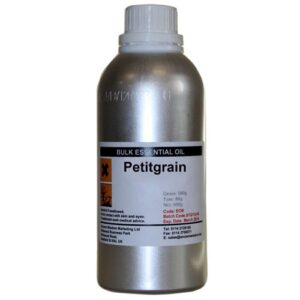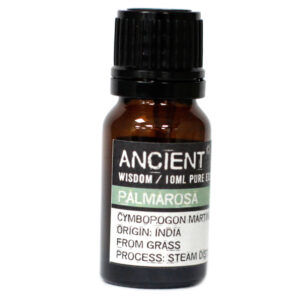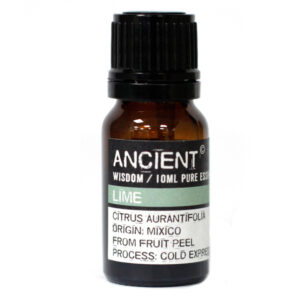
Description
The World of Aromatherapy’s Geranium Essential Oil
🌸 Unveiling nature’s floral tapestry, The World of Aromatherapy presents its Geranium Essential Oil, a fragrant ode to the heart’s truest passions.
🍃 Sourced from the lush petals of the geranium flower, this oil exudes a harmonious blend of rose-touched sweetness and a hint of minty freshness.
💆 Draped in myriad therapeutic properties, Geranium Oil beckons with the promise of balance and emotional wellness, making it a cherished ally in holistic aromatherapy practices.
🌍 Encased in our signature sustainable bottle, we ensure that each drop resonates with purity, integrity, and the promise of Mother Earth’s finest.
🌟 Immerse yourself in the enchanting embrace of our Geranium Essential Oil and let its aromatic ballet dance gracefully upon your senses, transporting you to verdant gardens of tranquillity.
Latin Name: Pelargonium Graveolens
Part Of Plant Used: Leaves, Stalks & Flowers
Source: Egypt
Extraction Method: Steam Distillation
Geranium Essential Oil is steam distilled from the leaves and stalks of the plant Pelargonium odoratissimum (apple geranium). It has a strong smell with a floral aroma, and hints of mint and apple. The main feature of this oil is its ability to balance and uplift, and it is used to do both on the mind and body, to ease a host of ailments.
Geranium essential oil helps balance oily and dry skin, and also brings about balance of the mind, relieving stress and anxiety. It is said to work on the adrenal cortex, which has a balancing effect on the hormone system. Geranium oil has
been used to treat acne, bruises, burns, cuts, dermatitis, eczema, haemorrhoids, ringworm, ulcers, breast engorgement, oedema, poor circulation, sore throat, tonsillitis, PMS, menopausal problems, stress, and neuralgia. Its strong smell
chases away mosquitoes. Add a few drops to shampoo to get rid of head lice.
These geraniums were believed to keep away spirits (like they did mosquitoes!) and so they were planted around houses as hedges. The plants originated from South Africa, Reunion, Madagascar, Egypt, and Morocco and were introduced to European countries in the 17th century. Although there are about 700 varieties of the plant, only 10 supply essential oil in viable quantities. The varieties planted in gardens usually produce too little oil to use for extraction.
Additional information
| Weight | 0.04 kg |
|---|---|
| Size | 10ml, 50ml, 500ml |
You must be logged in to post a review.
Related Products
Related products
-

Myrrh Essential Oil
£22.95 – £675.00Price range: £22.95 through £675.00 Select options This product has multiple variants. The options may be chosen on the product page -

Petitgrain Essential Oil
£5.95 – £115.00Price range: £5.95 through £115.00 Select options This product has multiple variants. The options may be chosen on the product page -

Palmarosa Essential Oil
£4.25 – £79.95Price range: £4.25 through £79.95 Select options This product has multiple variants. The options may be chosen on the product page -

Lime Essential Oil
£3.50 – £75.00Price range: £3.50 through £75.00 Select options This product has multiple variants. The options may be chosen on the product page
Geranium Essential Oil: Benefits and Uses in Aromatherapy
Geranium essential oil is a popular and versatile essential oil that has been used in aromatherapy for centuries. It is derived from the leaves of the Pelargonium graveolens plant, which is native to South Africa. The oil has a sweet, floral scent that is often used in perfumery, and it has a wide range of therapeutic properties that make it a valuable addition to any aromatherapy toolkit.
Geranium essential oil is a member of the Geraniaceae family, which includes over 700 species of plants. The Pelargonium genus is a large and diverse group of plants that includes many different species of geraniums. The plant is commonly grown for its ornamental value, but it is also valued for its medicinal properties. The essential oil is extracted through steam distillation of the leaves and stems of the plant, and it is used in a variety of applications, including aromatherapy, perfumery, and skincare.
Key Takeaways
- Geranium essential oil is derived from the leaves of the Pelargonium graveolens plant and has a sweet, floral scent.
- It is a member of the Geraniaceae family and is commonly used in aromatherapy, perfumery, and skincare.
- The oil has a wide range of therapeutic properties, making it a valuable addition to any aromatherapy toolkit.
Origins and Botanical Family
Geranium essential oil is derived from the leaves of the Pelargonium graveolens plant species, which is native to South Africa. The plant belongs to the Geraniaceae family, which includes over 800 species of flowering plants.
The colour of the geranium oil varies depending on its cultivar and country of origin. For example, the oil from China and Reunion is pale olive green, while Egyptian and Moroccan geranium essential oil is pale yellow.
Geranium essential oil has been used for centuries in traditional medicine for its many therapeutic properties. It is known for its antibacterial, anticandida, anti-inflammatory, and anxiolytic effects.
Traditional Uses
Geranium essential oil has been used for a wide range of purposes throughout history. Traditional medicine was used to treat various ailments, such as wounds, infections, and respiratory problems.
In aromatherapy, geranium essential oil promotes relaxation, reduces stress and anxiety, and improves mood. It is also commonly used in skincare products due to its ability to balance the skin’s natural oil production and improve the appearance of fine lines and wrinkles.
In addition, geranium essential oil is often used as a natural insect repellent due to its strong aroma. It is also used in perfumes and other fragrances due to its pleasant floral scent.
Overall, geranium essential oil has a long history of traditional use and is valued for its many therapeutic properties.
Extraction Process
Geranium essential oil is extracted from the leaves of the Pelargonium graveolens plant. The most common method used for extracting geranium essential oil is steam distillation.
During the steam distillation process, the leaves of the geranium plant are placed in a distillation chamber. Steam is then passed through the chamber, causing the essential oil to be released from the leaves. The steam and essential oil mixture is then collected and cooled, causing the essential oil to separate from the water.
Steam distillation is the preferred method for extracting geranium essential oil because it is a gentle process that does not damage the delicate chemical constituents of the oil. This method also produces a high-quality oil that is suitable for use in aromatherapy and other applications.
In addition to steam distillation, other methods of extracting geranium essential oil include solvent extraction and supercritical fluid extraction. However, these methods are less commonly used and may produce an oil that is not suitable for aromatherapy.
Overall, steam distillation is the preferred method for extracting geranium essential oil due to its gentle nature and ability to produce a high-quality oil that is suitable for use in aromatherapy and other applications.
Aroma Profile
Geranium essential oil is popular in aromatherapy for its sweet, floral aroma. It is extracted from the leaves and flowers of the Pelargonium plant, which is native to South Africa but is now widely cultivated around the world. The oil has a middle note and is commonly used in perfumery as a substitute for rose oil due to its similar aroma.
The aroma of geranium essential oil is often described as rosy, with citrus and sweet undertones. It is a versatile oil that blends well with many other essential oils, including lavender, bergamot, and clary sage. When blended with these oils, it can create a wide range of aromatherapy blends that are both uplifting and relaxing.
Geranium essential oil is often used in skincare products due to its balancing and astringent properties. It is believed to help regulate sebum production, making it useful for both dry and oily skin types. The oil is also used in massage therapy for its relaxing and decongestant properties.
Overall, geranium essential oil is a popular choice in aromatherapy for its sweet and floral aroma, as well as its balancing and relaxing properties. When used in combination with other essential oils, it can create a wide range of aromatherapy blends that are both uplifting and calming.
Therapeutic Properties
Geranium essential oil is known for its various therapeutic properties, making it a popular choice in aromatherapy. The oil is extracted from the leaves and stems of the Pelargonium graveolens plant and is believed to have antibacterial, anti-inflammatory, antiseptic, and astringent properties.
The antibacterial properties of geranium essential oil make it effective in fighting against harmful bacteria that can cause infections. It is often used in skincare products to help treat acne and other skin conditions caused by bacteria.
Geranium essential oil also has anti-inflammatory properties, which can help reduce inflammation in the body. This makes it a useful oil for those suffering from conditions such as arthritis and other inflammatory diseases.
In addition to its antibacterial and anti-inflammatory properties, geranium essential oil is also known for its antiseptic properties. This means that it can help prevent the growth and spread of harmful microorganisms, making it a useful oil for keeping wounds clean and preventing infection.
Finally, geranium essential oil has astringent properties, which means that it can help tighten and tone the skin. This makes it a popular ingredient in skincare products, as it can help reduce the appearance of fine lines and wrinkles.
Overall, geranium essential oil is a versatile oil with many therapeutic properties. Whether you want to treat a specific condition or improve your overall health and wellbeing, this oil is worth considering.
Geranium Essential Oil in Aromatherapy
Geranium essential oil is a popular choice in aromatherapy due to its uplifting and relaxing properties. It is derived from the leaves of Pelargonium graveolens, a plant species native to South Africa.
In aromatherapy, geranium essential oil is commonly used in diffusers to create a calming and balancing atmosphere. It can also be added to massage oils, lotions, and bath products to promote relaxation and reduce stress.
Geranium essential oil is known for its ability to balance emotions and hormones, making it a useful tool for those experiencing mood swings or hormonal imbalances. It can also be used to alleviate symptoms of PMS and menopause.
Also, geranium essential oil has anti-inflammatory and anti-bacterial properties, which is useful for treating skin conditions such as acne, eczema, and dermatitis. It can also be used to soothe insect bites and minor cuts and scrapes.
Overall, geranium essential oil is a versatile and valuable tool in aromatherapy, offering a range of benefits for both the mind and body.
Skin Benefits
Geranium essential oil has been used for centuries to improve the appearance of the skin. It is a natural astringent, which means it can help to tighten and tone the skin, reducing the appearance of fine lines and wrinkles.
Studies have shown that geranium oil has antibacterial, antimicrobial, and antiseptic properties, making it beneficial for reducing acne breakouts. It can also help to soothe irritated skin caused by eczema and dermatitis.
When applied topically, geranium oil can help regulate sebum production, which can be beneficial for those with oily skin. It can also help to improve circulation to the skin, which can promote a healthy, glowing complexion.
Geranium oil is suitable for all skin types, including sensitive skin. It can be used in facial serums and body oils to soothe skin irritations and calm inflammation. Here are some of the skin benefits of geranium essential oil:
- Tightens and tones the skin
- Reduces the appearance of fine lines and wrinkles
- Helps to regulate sebum production
- Reduces acne breakouts
- Soothes irritated skin caused by eczema and dermatitis
- Improves circulation to the skin
- Promotes a healthy, glowing complexion
Overall, geranium essential oil is a versatile and beneficial oil for improving the appearance and health of the skin.
Use in Perfumery
Geranium essential oil is a popular ingredient in perfumes, soaps, cosmetics and creams due to its pleasant aroma. It is often used as a substitute for rose essential oil, as it has similar properties but is less expensive. However, it is important to note that geranium essential oil is susceptible to frequent adulteration in fragrances due to its lower cost.
Rose geranium, a specific variety of geranium, is commonly used in perfumery due to its strong and sweet floral scent. It contains high levels of citronellol and geraniol, which are both important components in the fragrance industry.
Citronellol is a natural acyclic monoterpene alcohol that is widely used in perfumes due to its sweet, floral, and citrusy aroma. It is commonly found in rose, geranium, and citronella essential oils. On the other hand, Geraniol has a sweet, rose-like scent and is found in many essential oils, including rose, geranium, and citronella.
In perfumery, geranium essential oil is often blended with other essential oils to create a unique fragrance. It pairs well with other floral oils such as lavender, rose, ylang-ylang, and citrus oils like bergamot and lemon.
Overall, geranium essential oil is a valuable ingredient in perfumery due to its pleasant aroma and versatility in blending with other essential oils. However, it is important to ensure that fragrance oil is not adulterated to maintain its quality and effectiveness.
Combining with Other Essential Oils
Geranium essential oil blends well with a wide range of other essential oils, making it a versatile oil that can be used in various aromatherapy applications. Here are some essential oils that combine well with geranium oil:
- Clary Sage: When combined with geranium oil, Clary Sage can help to relieve stress and anxiety. The two oils work together to promote relaxation and calmness.
- Lavender: Geranium oil and lavender oil complement each other well, and their combination can help to alleviate headaches, promote relaxation, and improve sleep quality.
- Rosemary: Geranium oil and rosemary oil can be combined to create a refreshing and stimulating blend that can help to improve mental clarity and focus.
- Sandalwood: When combined with geranium oil, sandalwood oil can help to balance emotions and promote relaxation. The two oils work together to create a grounding and calming effect.
- Juniper: Geranium oil and juniper oil can be combined to create a refreshing and uplifting blend that can help to improve mood and promote mental clarity.
- Frankincense: Geranium oil and frankincense oil can be combined to create a soothing and grounding blend that can help to promote relaxation and reduce stress.
- Orange: Geranium oil and orange oil can be combined to create a refreshing and uplifting blend that can help to improve mood and promote relaxation.
When blending geranium oil with other essential oils, it is important to use high-quality, pure essential oils and to follow safe blending practices. Aromatherapists recommend using a maximum of 3-5 drops of essential oil per 10ml carrier oil. Doing a patch test before using any new essential oil blend on the skin is also important.
Precautions and Safety Information
Geranium essential oil is generally safe to use when applied topically or inhaled. However, it is important to keep in mind some precautions and safety information to avoid any adverse reactions.
Firstly, it is recommended to dilute geranium essential oil with a carrier oil such as jojoba oil before applying it to the skin. This will help prevent skin irritation, especially for those with sensitive skin. A general rule of thumb is to use a 2% dilution rate, which means adding 12 drops of essential oil to 1 ounce of carrier oil.
When using geranium essential oil on children, it is important to use caution and follow proper dilution guidelines. It is generally recommended to avoid using essential oils on babies under three months old, and to use a lower dilution rate for children under 12 years old.
It is also important to avoid getting geranium essential oil in the eyes, as it may cause irritation and discomfort. If this happens, flush the affected area with water and seek medical attention if necessary.
Those with allergies or sensitivities to geranium or other essential oils should avoid using geranium essential oil. It is recommended to perform a patch test before using the oil to ensure that there is no adverse reaction.
In summary, while geranium essential oil is generally safe to use, it is important to take precautions and follow proper dilution guidelines to avoid any adverse reactions. It is always best to consult with a qualified aromatherapist or healthcare professional before using essential oils.
Health Benefits
Geranium essential oil is known for its numerous health benefits. It has been used for centuries in aromatherapy to treat various ailments. Here are some of the health benefits of geranium essential oil:
Reducing Stress, Anxiety, and Depression
Geranium oil is known for its calming and relaxing properties, making it an effective remedy for reducing stress, anxiety, and depression. It can help to balance the hormones and promote feelings of well-being.
Relieving Menopausal Symptoms and PMS
Geranium oil can help to alleviate the symptoms of menopause, including hot flashes, mood swings, and sleep disturbances. It can also help relieve premenstrual syndrome (PMS) symptoms, such as cramps, bloating, and mood swings.
Reducing Inflammation and Aches
Geranium oil has anti-inflammatory properties that can help to reduce inflammation and swelling in the body. It can also help to relieve minor aches and pains, such as joint pain and headaches.
Treating Edema and Fluid Retention
Geranium oil can help to reduce oedema or swelling caused by fluid retention. It has diuretic properties that can help to increase urine output and reduce swelling.
Fighting Infection and Boosting Immunity
Geranium oil has antimicrobial and antiseptic properties that can help fight infections caused by bacteria and fungi. It can also help to boost the immune system and protect the body against infections.
Lowering Blood Pressure
Geranium oil can help to lower blood pressure by relaxing the blood vessels and improving circulation. It can also help to reduce the risk of heart disease and stroke.
Improving Skin Health
Geranium oil is known for its benefits to the skin. It can help improve the skin’s appearance by reducing inflammation, balancing oil production, and promoting cell regeneration. It can also help to treat skin conditions such as psoriasis and varicose veins.
Supporting Neurodegenerative Disease
Geranium oil has been shown to have neuroprotective properties that can help support the treatment of neurodegenerative diseases such as Alzheimer’s disease. It can help to protect the brain cells from damage and improve cognitive function.
Purchase and Storage
Geranium essential oil is a popular choice for aromatherapy enthusiasts. It can be purchased from a variety of retailers, both online and in physical stores. When purchasing geranium essential oil, it is important to ensure that it is 100% pure and natural. Look for reputable brands that provide information on the source and extraction method of the oil.
Geranium essential oil is available in different sizes, ranging from 10ml to 1000ml. It is recommended to start with a smaller size to ensure that the oil is suitable for individual needs before purchasing larger quantities. Some retailers also offer bundle deals, which can be cost-effective for those using geranium essential oil frequently.
When storing geranium essential oil, keeping it in a cool, dark place away from direct sunlight is important. Exposure to heat and light can cause the oil to deteriorate and lose its potency. Geranium essential oil should be stored in a glass bottle with a tight-fitting lid to prevent air from entering and oxidizing the oil. Keeping the oil out of reach of children and pets is also important.
Using geranium essential oil within one year of purchase is recommended to ensure its freshness and potency. Over time, the oil may lose its therapeutic properties and become less effective. If the oil has a rancid smell or has changed in colour, it should be discarded and replaced.
Overall, purchasing and storing geranium essential oil is a straightforward process. By following these simple guidelines, individuals can ensure that they are getting a high-quality product that will provide the desired therapeutic benefits.
Conclusion
Geranium essential oil is versatile, with a wide range of potential benefits. Aromatherapy is commonly used to promote relaxation, relieve stress and anxiety, and improve mood. The oil is also believed to have antibacterial, antimicrobial, and antiseptic properties, making it useful for reducing acne breakouts and other skin irritations.
Geranium oil is often blended with other essential oils to enhance its therapeutic properties. It blends well with citrus oils like lemon and grapefruit and wood oils like cypress and frankincense. Some of the most common uses for geranium oil include:
- Relieving stress and anxiety
- Reducing acne breakouts and other skin irritations
- Improving mood and promoting relaxation
- Balancing hormones and reducing symptoms of PMS and menopause
- Boosting the immune system and fighting infections
It is important to note that while geranium oil has many potential benefits, it should not be used as a substitute for medical treatment. It is always best to consult with a healthcare professional before using any essential oil, especially if you have a medical condition or are taking medication.
When using geranium oil, diluting it properly and using it in moderation is important. Some people may be allergic to essential oils, so it is always best to do a patch test before using any new oil on your skin.
Overall, geranium essential oil is a valuable addition to any aromatherapy routine. Its pleasant scent and potential therapeutic benefits make it a popular choice for many people looking to improve their health and well-being.

















Reviews
There are no reviews yet.